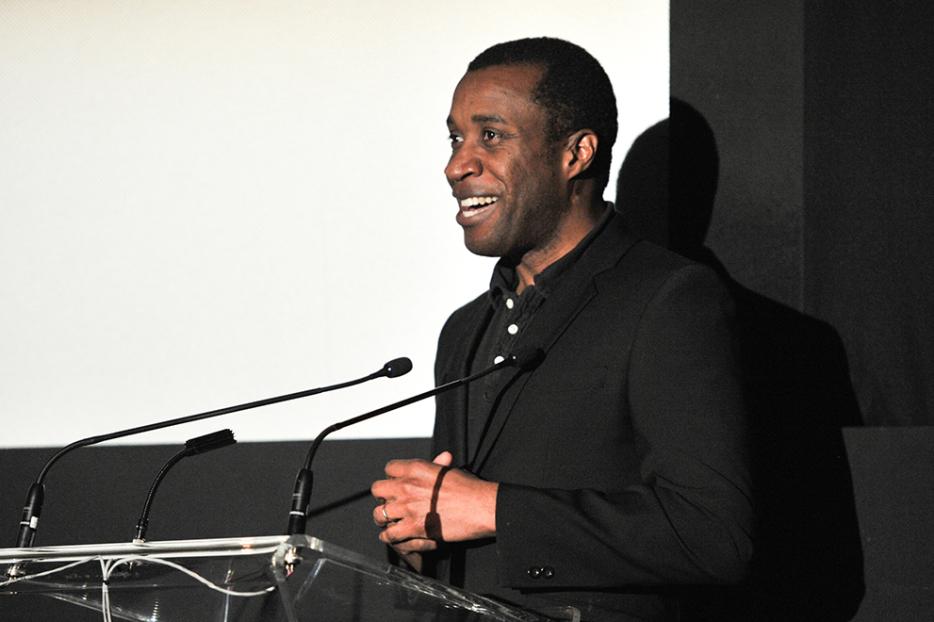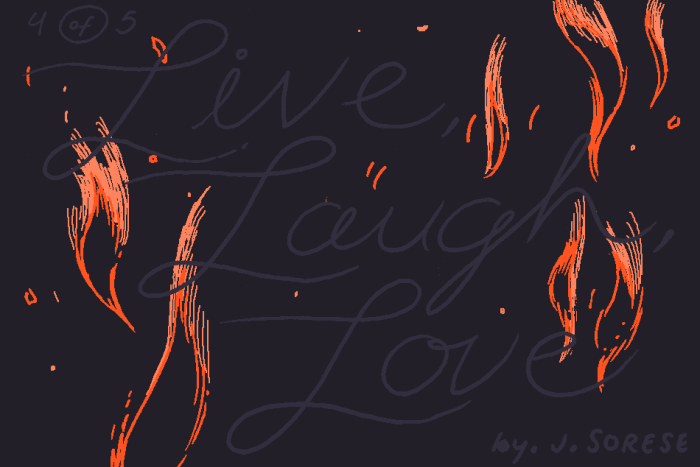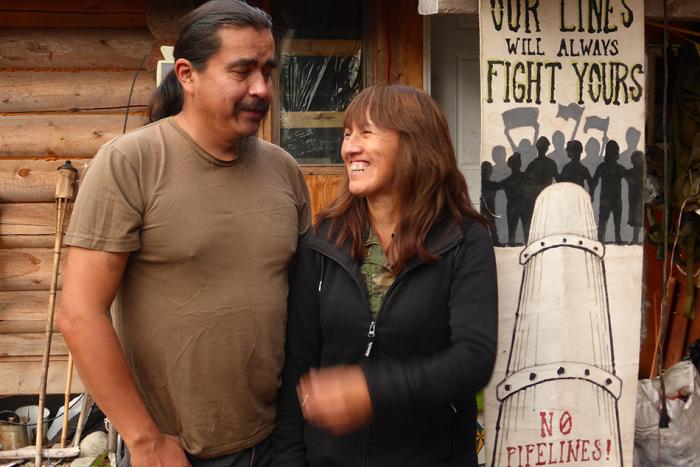In his autobiography Measure of a Man, Sidney Poitier describes the first time his parents saw him on the big screen. In the year 1950 in a theatre in Nassau, Bahamas—his hometown—the movie No Way is playing and Poitier’s parents are thrilled. When one of the characters, Ray, begins pistol-whipping the young Black Dr. Luther played by Poiter, his mother stands up, saying, "... 'Hit him back, Sidney! Hit him back! You never did nothing to him!' In front of everybody. My brothers and sisters are squirming and laughing, saying, 'Mama, sit down, sit down.' But she’s not joking. She’s for real, completely in the moment. 'Hit him back, Sidney! Hit him back!'”
Sidney Poitier hits back in another movie. In In the Heat of the Night, a racist Southern plantation owner slaps Poiter’s Virgil Tibbs for the audacity of being a Black man who dares to ask him questions. Tibbs’s response is instantaneous: he slaps the man back. It is an explosive scene that still resonates today. Poiter insisted that scene be included in the film.
That same scene echoes forward in Clement Virgo’s stunning six-part mini-series The Book of Negroes, adapted from a work by Lawrence Hill. Solomon Lindo—a businessman who buys Aminata away from her much crueler master—slaps her, Aminata slaps him right back. It’s a telling choice, then, that Virgo, a Canadian filmmaker who captures the lives of Black Canadians, selected In the Heat of The Night as the film to watch for his installment of TIFF’s Books on Film Series. I spoke with him after the event.
*
Vicky Mochama: A lot of your films touch on Black lives in so many different ways. I wanted to know what compels you to keep making films and telling stories about Black people and their lives?
Clement Virgo: The same reason white people make films about white people lives. Because I think we all make films that reflect who we are. We like to see stories that reflect people who look like us but at the same time we live in the modern world. I live in Toronto and it’s a very diverse city. I tend to want to makes stories that reflect that diversity.
Was it challenging starting your career and knowing that you’d want to make these kinds of stories? As Black Canadians, I feel like we don’t really see ourselves, or it's unlikely to see ourselves reflected in TV and movies. Was it challenging to be out there insisting on telling these stories?
I think it was easier when I started, actually. I think it’s a bit more difficult now. It is a challenge when you’re trying to cast it and you get the feedback that perhaps there aren’t a lot of young Black Canadians who could get a film made or get a television series made. But it doesn’t stop me from trying to get it done. But now it’s much more difficult. The stakes are higher. But those are the stories I want to tell. Those are the stories that interest me.
When you say it’s difficult now, the stakes are higher...
In the environment that we live in now, there’s a real sense that if you want to sell your movies that perhaps Black faces wouldn’t sell internationally or in parts of Europe or Asia. So if you want to make a film for a certain budget, there’s a sense that only certain kinds of faces will sell in these parts of the world. Sometimes it’s difficult to convince financiers that this young Black woman can sell in Asia or in Europe.
You live in Toronto, you grew up in Regent Park and Alexandra Park, and a lot of your films tell a story of Toronto or of Torontonians. I’d be interested to hear your take on the way that Drake is pushing and promoting a vision of Toronto. Is there a moment now to tell a story of a new kind of Toronto?
What’s interesting about that is that it didn’t start with Drake. If you look back at the music scene—the Black, urban music scene in Toronto—from the late ‘60s and ‘70s, there was a new wave of immigration of people from the Caribbean who came to Toronto. There was a music scene at that time. At that time, the Canadian music industry was insistent that a certain amount of Canadian music was played on Canadian radio stations. That was the goal and the mandate of the country. So the music scene became vibrant.
By the time you got to the late ‘80s and the ‘90s, you had people like Michie Mee and Maestro Fresh Wes. You had kids from Vancouver and Halifax in Toronto. You had Saukrates and Kardinal. That blossomed and grew, and now we have Drake. It was years of development where you suddenly have this vibrant music scene that fed off what young Black people are doing.
And now in 2016, all those years of building up the music industry, the film and television industry still has to catch up. We haven’t had a Drake or the Weeknd in the film and television industry. He kind of represents the best of what the city is and what the country is.
It would be super interesting to see. I’m interested in how he’s spawned not just a music scene but also a creative drive. I was at TIFF last year and I met a young Black male director and he immediately said that Drake is the reason he felt he could do it.
He is a force of nature. Every city has its movement. As a filmmaker, I look at New York between the ‘70s and ‘80s for the movement of filmmakers of the time like Scorsese, Francis Ford Coppola, Lumet, Spike Lee, Jim Jarmusch, Woody Allen. Or Paris: you had Truffaut and Godard—these New Age filmmakers of that period. Or even in music. Prince just died. You think of Minneapolis in the ‘80s: The Time, Morris Day. Or grunge music: Seattle in the ‘90s. Drake is at the centre of the movement that is happening in Toronto right now.
He’s helped to inspire everyone that is part of the creative industry. But he’s not the only one. There are others. I remember when I first heard that there was this mixtape from the Weeknd. I thought, who is this kid that’s coming out with stuff that’s amazing? And I got inspired by it. I walked around writing my scripts and listening to his songs. I got inspired by that.
How does music fit in to how you work and how you create?
It’s integral to be able to set the mood with music when I write. You’re trying to create a world as an artist and as a filmmaker. When I wrote The Book of Negroes, I was listening to a lot of soul music—a lot of Bobby Womack, Bob Marley, Fela [Kuti]. For me, music sets the feel and tone to the story that I’m trying to tell.
Speaking of The Book of Negroes, I wanted to talk about your approach to writing a film based on a book. How do you as a filmmaker find the moments in a book or in a character where you’re telling a true and full story?
For me, it’s all about the character. When I read the book, I loved Aminata. You’re trying to figure out how to be economical. You’re trying to figure out, what are the key moments to keep? You’re trying to figure out what is the key essence of the character you’re trying to communicate to the audience. Part of the strategy that I used with The Book of Negroes was to put Aminata into every single scene. She’s in practically every scene in the novel but to have her in every scene is to locate our point of humanity and empathy. She’s taking us through this journey
In terms of how, I broke down the structure of the book. The book had a structure to it that she came from Africa, she grew up in America, she was in New York, and then she went to Nova Scotia. Each episode had to encompass these time periods. I was sort of strict with how I broke it down. Like a good three-minute song, you have to really find the right hook. What are the verses? How do you make it tight? So, how do you find the essence of it?
As you were writing in smaller details or moments happening in the background, did you find you were writing yourself into it as much as you were writing what was in the book?
Yes, I’m sure we all do. We all use our personal stories in everything that we do. Our personal story informs how we see the world, and we try to figure out how we make sense of the world. The first question you asked me was about why you want to tell stories about Black people. Because that’s what I see and that’s the world I’ve lived in.
Art is about showing your sense of the world to yourself. So even if I’m writing a little story or whatever it is, I’m going to leave secrets about who I am in that story. It’s hard to just be detached and not infuse your personality, and infuse yourself in the work. For me, those kinds of books speak to me. When I read a book or hear a song or see a movie, I want to see the person who made it.
A book, I feel, insists that you meet it where it is. It is going to tell you about its world where it can. A movie, however, has to do a different kind of work. How much do you as a filmmaker try to concede to the audience their idea of what a film should look like?
Often times, I try not to think too much about the audience. I try to think about what is it that speaks to me about it. How do I translate and how do I surrender to what the work is telling me? It’s not calculated. I want the work to come out, emotionally and intuitively, and to come out as it flows through me. Once it’s done then I can start using my head and become more intellectual about it.
In the case of The Book of Negroes, I didn’t want to make a movie about slavery or a TV show about slavery. I didn’t want to go to that part of myself. Who wants to see that stuff? Who wants to just see Black people being downtrodden? And who wants to see us be enslaved? I don’t want to make that movie. Even the title of the thing: What is The Book of Negroes? I don’t want to watch a movie called The Book of Negroes. I don’t want to read a book called The Book of Negroes.
When I got over my own internal prejudices around that, then I saw it spoke to me. It spoke to me on a visceral level that sometimes I couldn’t articulate. It spoke to me on a visceral emotional level so all the objections and prejudices I had around making a story about slavery and seeing Black people in chains—all those things went out the window because it was a story that spoke to me. It made sense and had a point of view that I could make a film about. After I wrote the script, then I thought, how could I sell this? Then it became a question of marketing and selling. How could I convince people to go out and watch this work that I feel passionate about.
So after it had been done, that’s when you brought in the idea of an audience and how to get them into it. In the writing of it (in approaching any kind of book), where do you allow yourself to diverge from the source? The Book of Negroes is a thick and intense book. Are there moments where you say, there’s another way to talk about this moment?
A movie has a different kind of process than, say, a book does. In a book, a character can go internal and you can spend pages on describing your emotional landscape, of the mind, or when they’re a child. In film, you kind of insist on an economy; you insist on a discipline where you show and tell. You can’t stop to have a sidebar. I said this to Lawrence Hill: in a novel you can have major characters die off-screen but in a movie if you invest an hour and half in a character and you love that character, you want to see what happens. You can’t hear about what happens to them, you need to see what happens to them. There’s a kind of visual storytelling that has to happen that when you write a novel, you can use prose to do that.
The novel builds an atmosphere and creates a world and takes time to set Aminata in a place but with the miniseries you have to do that immediately. Can you give me an example of a place where you had to build in the atmosphere as you went along?
In episode two, she lands in America and she spends time describing where she is. She’s describing the different shades of people, the different skin colours. She describes the world she’s in; she describes the streets, the smells, the atmosphere. You couldn’t do that in the miniseries. You can’t have a voiceover that goes on and on about this.
Her baby is stolen in episode two and all she wants to figure out is, ‘Where is my baby and how do I get my baby back?’ She suddenly has to have a more concrete, story-driven mission of what she wants. I think certain filmmakers could get away with that kind of atmospheric tone poem. The Book of Negroes as a miniseries couldn’t be an atmospheric tone poem. It has to have much more of a drive.
Absolutely. There is a narrative to The Book of Negroes that has to be told and it’s more about her than it is the places per se.
Exactly. So it’s much more about her journey and it has a kind of propulsive narrative that keeps you suspenseful, keeps you following her moving forward. It’s a road movie.
She’s Dorothy going to see the Wizard and she’s on this yellow brick road and on the road she meets all these interesting people—she meets the scarecrow, she meets the tin-man, she meets the cowardly lion. She meets all these people and all she wants to do is to get back to Africa; she also wants to get back to Canada. The Wizard of Oz is the quintessential road movie and The Book of Negroes has a very similar structure where she is on this road. And as she says in the novel, “Black people—we are a traveling people.”
TIFF’s Books on Film series brings together creators from the worlds of books and film, and Hazlitt is a media sponsor, which is nice. This June, actor Kathryn Hunter explores A Midsummer Night’s Dream, and author Helen Macdonald discusses her memoir H is for Hawk, before a viewing of Ken Loach’s Kes. Trust us, you’ll like it.






